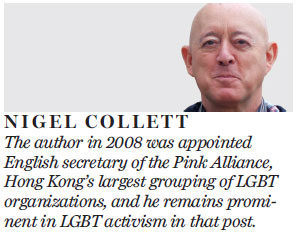Gay marriage law will make millions happier and society much healthier
Updated: 2015-07-06 06:54
By Nigel Collett(HK Edition)
|
|||||||
About 5 percent of the men and women of any generation will be exclusively sexually attracted to others of their own sex. (This appears to be true of many animal species, and humans are not exempt from this natural order of things.) In China's case, that means there are about 69-70 million men and women who have same-sex orientation, a number bigger than the entire population of the United Kingdom. We may add to that by at least a factor of three the number of people whose lives are affected by a gay or lesbian child; for each, of course, will have two parents, and many will marry. There are thus about 280 million Chinese people personally affected by the inexorable facts of sexual orientation. Numbers alone make it clear that the well-being of such a large number of people has to be the subject of government attention.
The recent Supreme Court ruling in the United States that has legalized same-sex marriage nationwide has focused minds on the issue across the world. As of today, there are 18 countries where same-sex marriages are legally performed and three where legislation enabling such marriages has been passed (including Ireland, after a referendum delivered a large majority in favor of the change). There are also 26 jurisdictions where a form of civil partnership allowing spousal benefits - though not the name of marriage - is legally permitted.
None of these are in Asia, though this may not be a situation that holds for much longer. Nepal's constitution, scheduled to be completed in August this year, will recognize marriage between any two persons. Legislatures in Thailand have favorably examined the issue, though so far without result. Vietnam has removed a law making same-sex marriage illegal, although it does not recognize the institution. The third largest political party in South Korea, the Democratic Labor Party, includes same-sex marriage in its platform. In Cambodia, recognized same-sex marriages have been conducted in religious, though not civil, ceremonies. Is same-sex marriage something that China might examine as a tool of social policy?

Official recognition of same-sex relationships offers some practical benefits. One is demographic. The gender ratio at birth in China is 120 males to 100 females, which means that there are now 41 million men who will not find a wife. By 2020 there will be 55 million. Removing the need for many gay men and lesbian women to undergo sham marriages will free up the heterosexual partners they would otherwise have married and who now endure often loveless and heartbroken lives.
Another benefit arises from reducing the huge social and financial costs of preventing gays and lesbians from living legally structured and socially recognized lives. Legal partnerships reduce promiscuity and remove social stigmas that encourage sexually transmitted diseases to flourish in the dark corners of the closet. Gay men and women in societies where prejudice and discrimination go unanswered suffer higher rates of psychological problems, suicide, and drug and alcohol abuse. Employees who cannot live open lives are quantifiably less productive at work. Behind all this, of course, lies the fact that China has about 280 million people who, to some greater or lesser degree, are unhappy now and whose lives could be improved immeasurably by enacting laws that would not have any appreciable practical downside.
The time seems to be ripe for change, for attitudes have altered rapidly as China's population has become more educated, open-minded and sophisticated. Research conducted last year by The Chinese Journal of Human Sexuality showed that nearly 85 percent of 921 respondents supported same-sex marriage, a tiny 2 percent were opposed to the idea, and 13 percent were unsure.
There is a caveat here, however. Legalization of same-sex marriage is insufficient as a measure, for it alone will not work in all places and at all times. As activists in Hong Kong point out, few gay men and lesbians here would dare to marry even if it were legal to do so, for they have no protection from being dismissed from work or ejected from their accommodation. This city is just too small a fishbowl to keep a legal marriage secret in. Certainly in Hong Kong, and probably across the mainland, there is a need for prior enactment of legislation to protect same-sex couples from discrimination. It seems there is a need either to do that first, or to enact both anti-discrimination legislation and legislation for some form of same-sex union as a package.
York Chow Yat-ngok, head of the Equal Opportunities Commission, has recently supported legalizing same-sex marriage in Hong Kong, although he expressed the fear that it would not occur in his lifetime. I think he is over-pessimistic. As the US Supreme Court has recognized, it is growing increasingly difficult to maintain that it is not a fundamental human right. Even the arguments of those who oppose it have tacitly accepted this and now focus on protecting religious freedoms.
Social harmony and financial savings, not to mention enhanced productivity in the workplace, can be achieved at the stroke of a legislator's pen, on top of making millions of people happy. What is there to lose?
(HK Edition 07/06/2015 page8)